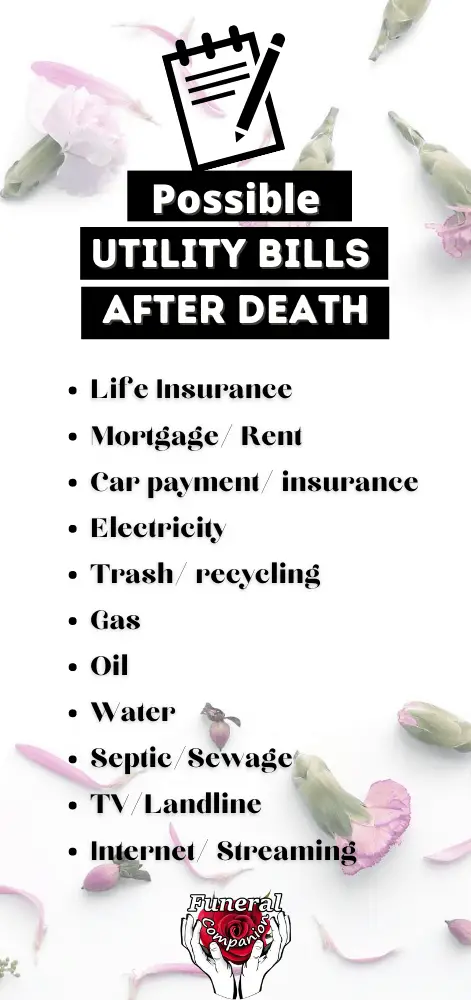The utility bills are something that we don’t even want to think about on good days.
When someone dies they do tend to leave behind bills that are in their name that someone else may or may not have cosigned for. So, if you are left dealing with these unpaid utility bills, what do you do?
For legal reasons, you want to inform all utility companies about the decedent. After this, whoever is responsible, depending on state laws, should pay the final bill. Then, the spouse or new tenant would want to change the name on the bills to theirs, to avoid any confusion or legal repercussions.
While you may be able to leave the bills in the decedent’s name and have no issues, this may not be the best idea if you want to prove something like proof of residency.
Each state and company will have its own rules and regulations on how these things are done. Below I will go into the best ways to approach this situation and why.

What are classified as utilities in the US?
No two-state, counties, municipalities, etc. have the same laws. This also goes for each of the utility companies. Generally speaking, utilities in most of the United States are electricity, water, sewage, natural gas, garbage, and oil.
Oil is special in some cases. If the oil is not used for heating then it is not classified as a utility because buying oil at that price is much cheaper than on the open market. You can actually be fined and arrested if you buy and use this oil for other purposes than heating.
Telephone, cable, and internet services are a gray area. They are not usually considered a utility. Out of the three, the cable is most often put into the utility category.
Just because the definition of the service is not a utility, I would still treat it as one and follow the same steps and processes that I will go over below. You always want to take care of these bills, because in some cases you may be pursued legally if they aren’t paid.
I want to preface the rest of the article by saying that I am not a legal professional nor claim to be one. Though I do have extensive knowledge and experience dealing with matters and issues of this nature. This guide will help you and guide you to make the best general choices.
How quickly do you need to pay bills?
This will differ for every person and situation as most things will. You need to assess what has happened and if you need to do it right away.
Spouse – Staying
If you are the spouse and still going to be living in the residence after your spouse or partner has sadly passed away, then you should pay the bills normally.
You will still want to notify every company of the situation by visiting the office or sending them a letter stating what has happened and that you will be taking over the payments.
If you are leaving the residence and or don’t have enough money it is not a rush in most cases. Unless you have an outstanding bill of thousands of dollars they will not be calling the creditors to get you.
You will normally have 60-90 days to pay outstanding bills if you are responsible to pay for them.
Spouse – Leaving

If you are not staying at that residence and moving to a different one you may want to pay the bill.
You will usually have 30-90 days for the final payment before it goes to delinquency and the services get shut off. It will be another 30-90 days as well before it goes to creditors in most cases.
The only time that you would not want to pay is if you need to pay for other things. There is a hierarchy of things that you should pay for first such as a hospital bill. If you are a resident in any of the following states, please read my article – New York – California – Wisconsin.
Even if you cannot pay the bill when you leave you will want to take it out of your or the decedent’s name.
Family/ Executor
Often an executor or the person in charge of the decedent’s estate will start to receive mail and bills quickly after they have died.
Utility companies and bill collectors will be quick to try to get the payment in case the money goes away and they feel that they are entitled to payment first.
If you are in charge of the bills, then utility bills are often near the bottom of the list for things that need to be paid first.
In some cases, if you actually pay these bills off first and don’t have enough for something else it is a breach of fiduciary duty and it is possible though rare that you could be held liable for this.
Creditors are broken up into different classes from low to high. So you would want to pay off the federal income tax (the higher-class creditor) over a utility company (the lower-class creditor).
Tenants
When moving into or leaving a new apartment or house you should notify the utility companies that you are there.
Moving out
If leaving any residence, you should notify the landlord and all utility companies that you are leaving and close out your bills. Even if it is a friend or relative that is moving into the place.
You want to cover yourself for insurance and if something was to happen and the person that moved in couldn’t cover the bills.
If, for example, you moved out and do not close out your bills and that person that is living there now uses your services without paying the bill.
This could not only ruin your credit but also cause you to owe a lot of money. In the worst-case scenario, you may end up in court and have to defend yourself if the bill is large enough. Even if you are not the resident you will most likely be held liable since you did not change the name.
This is also true if a person who was named on the bills passed away and you are moving out for personal reasons.
Moving In
When you move into a place you will want to have the bills put into your name. There are a few reasons for this starting with the fact that it will allow you to know how much the bills are going to be.
Most landlords will allow this because it will save them the hassle if you do not pay the bill, as it is your fault and you will be held responsible.
You also want it to be in your name because if the last tenant was late or did not pay, you will not be held accountable and have debt and or your services turned off for something that you had no control over.
This could be especially true if the last tenant actually died and is unlikely to pay their bills.
Lastly, your credit. In America, your credit score will affect everything from your ability to get a loan to a job. By having utility bills in your name and paying them on time, it will increase your credit score and prove that you can handle it.
I recently looked into getting a loan and I’ve actually had a good experience with Supermoney.com. For me, it was a car loan but I spoke to them about a dedicated funeral expenses loan, which is one of the services they offer and was quite impressed. To see if you could qualify, check out my link here.
Are you planning a funeral? If so, please look at my recommended resources page for ways to give your recently departed loved one a dignified ceremony for less.
What is a community property state?
Where you live will be a big factor in the speed at which you pay the bill as well as if it is a community property state. You will need to check your state laws (or ask your lawyer) to see if you are responsible.
In America, there are states that are called community property states. This means that the debt that is incurred during the marriage is considered a marital obligation.
The spouse will be liable to pay the debt and bills of the deceased. Not all states have this rule and law will still even vary in those states on the wording of the actual law.
The states having community property are Arizona, California, Idaho, Louisiana, Nevada, New Mexico, Texas, Washington, and Wisconsin.
What happens if there is no money to pay the bills?
There are many different reasons why this may happen and it will depend on who is liable to pay the bill. No matter who is responsible though, if there is some money and you are trying to decide where it will go, always take care of the major expense first.
For smaller, less important bills, like the utility bill, you can ask to settle. These companies are able and will negotiate a price with you. They are not new to this situation and if you explain your circumstances and tell them what you can afford, they are usually happy to make more money than none. It saves them time and money to do this.
If the liability is on the executor and they knew nothing about a utility bill and paid all other bills off first. They may be held legally responsible to pay the utility bill and it would have to come out of their own pocket.
The more common issue here is that the executor often pays off the utility bills first and forgets about other ones like a tax bill that come less frequently.

Don’t rush to pay everything at once
Take your time when paying bills. Notify the utility companies that the person is deceased and they will get their money and find out what is the timeframe that you can legally wait to pay the bill before it becomes delinquent.
When it is your spouse or partner that dies and you are still living in the house but have no money it becomes a little trickier.
Sometimes that person was the sole breadwinner and there may not be enough money to cover everyday expenses. Depending on the state and if your name is on the utility bills you may or may not be held legally responsible.
As above, I would take care of the larger bills first and think about moving to a place that you can afford. You will probably want to settle with the company so if you move to another building that uses their services they will still serve you.
A lot of utility companies have a monopoly on services in smaller towns and if you don’t pay at one residence they could choose not to serve you at your next place of residence.
If you find yourself stuck for cash, a credit card is a final resort and can help to give you a little extra time. I recently got a new credit card through Principal Platinum and am really happy with the deal I was able to get.
If you are in a situation where the money is tight and you also need to afford the funeral on top of these utility bills, please refer to some of my other articles:
- What Really Happens When Someone Dies With No Known Family?
- Tips That Work: How Do You Pay For A Funeral With No Money?
- Who Pays for the Funeral If There Is No Money or Will?
Who is responsible for paying utility bills after death?
The ones that are responsible to pay for the bills are the executor of the estate, the spouse in communal property states, a cosigner, or the landlord of the property.
If you are a relative or family member that did not sign any paperwork and were not residing at the property you have no legal obligation to pay the bills.
The company may try to contact and ask for payments. This isn’t illegal but it is most certainly frowned upon. They are just trying to recoup their losses but as long as they don’t say you must pay or threaten you with the court, it is technically legal.
Don’t fool for it, unless you are in a position to pay and not suffer too much from the financial loss.
How can you find out what bills the person pays each month?
Unless they left behind a will or a list of the utilities and bills that they owe this could be a bit harder to figure out and your Sherlock Holmes skills will come into play.
I will layout the best way to go about this but it will be different for a spouse compared to a relative
- A will- Even if you are not leaving behind any money or assets you still want to have a will for everyone’s pieces of mind. In the will, you would leave behind information such as the bills that you have and where the funds would come from.
- Wallet/Purse- A wallet will show what bank cards and the credit card that the person has. This also may contain checks or receipts that you can use to track down what bills are owed. Or a bank or credit card company to contact to see what is being paid from those accounts.
- Documents- You next want to see if they left any documents around the house. Common places are drawers, side tables, and the kitchen. It sounds easy but it is often overlooked because it is so simple and we all have our own drawer full of old documents and paper.
- Mail- The mailbox and where they store the mail may lead you to more utility bills that they have left. This is not always going to help now as more companies offer a slight discount to go digital. Also, check the legality of opening the mail because if you are legally not allowed to it is still a federal offense even though there is a minuscule risk that one would get prosecuted for trying to pay bills.
- Calendars- Look around the house for a calendar on the wall and if possible on their computer or phone. People often put reminders and have things that they need to do on these and we usually don’t think twice when we pass them as they are so commonplace.
- Bank Account/Credit card statements- There may not be any trace of bills around, but most people now pay their bills from a credit card or a bank account. So if you don’t see a utility bill and have access to their financial statements read through there to see if there are any monthly recurring payments.
- Computer/ Phone- This is where it starts to get tricky and you will need a password or some help to access these types of electronics. I know people keep more information than there should easily accessible in their phones and computers. This is often where we store lists and things we need to do such as pay bills.
- Email- Email is something that I would say check first, but it will most likely be the hardest to gain access to. You will almost certainly need a password to access it and companies like Google and Yahoo are not keen to give access to someone else’s account without a court order and written approval from that person. One trick that may work if you are close with the person is that you could click the forgot the password button and try to answer the security questions.
- Walk around the house and talk to neighbors- In a last-ditch effort, you will have to use your powers of deduction and channel your, inner Sherlock. Asking the neighbors what services are offered in the area could start to narrow it down but if there are multiple providers you will have to call and ask them.
Here is a list of utilities and bills that people often have:

Life Insurance- The reason that you want to look for this bill or plan first is that with it you can contact the company and if they have insurance this could be used to pay all the bills including the utility bills.
If you are learning the lessons of not having life insurance and leaving your loved ones with enough money to cover your final expenses, then see my recommended life insurance brokers for the cover you REALLY need.
Mortgage/ Rent- These are not utilities but will be a major bill that will need to be addressed and put at the top of the list. Bank statements or the actual bank are the most commonplace to find who they owe money to. In a city, there are a lot of places but in a smaller town the credit unions usually give out loans.
Car payment/ insurance- The decedent may not have paid all of the cars off or his/her insurance. Go to the glove box or under the seat to see what documents are there to start the process.
Electric- Check the meter outside the house, also look to see if they have solar power because in some places the company may be paying you for the power as well.
Trash/ recycling- There are very few companies that service areas. Just look at the side of the trash can or just ask the neighbor. Trash usually comes twice a week and just see when it is and ask the garbage person if you can.
Gas- Natural gas for heating and a stove are most commonly used and there should be a meter located on the ground somewhere around the property with the name of the company on it. It would be near the house with a small pipe going from the ground to a box 1X1ft and a pipe going into the house.
Oil- People usually buy oil a few times a year from service. It is rarely pumped to the house but it is still good to check. In the basement or possibly outside you will see most often a large steel tank.
They usually are red in color and very large, the company will have left a sticker on it as well to contact in case of emergency or for a refill. I would call them just to see that there is no outstanding bill for scheduled delivery.
Water- In cities, you will probably only have one option of the city’s water to choose from or if you get delivery in bottles/jugs. Outside the city, you could have more options such as groundwater or even well water.
Asking the neighbors what they use or what is available would be the easiest way to find out. If you are in a cold area and it is winter you also want to either use the pipes every day or have them flushed so that they do not freeze and explode.
Septic/Sewage- Again if you are in a city you will almost always have a sewage system that the city provides but you will have to pay for it.
In other areas, you may have two options one to use sewage if it is possible or your own private septic system. This will be very easy to know by just walking around the yard and looking for a large bump in the yard and usually a little sign or post to mark where it is.
If you have sewage you just pay the bill but if it is a septic system someone will come to the property to empty it from time to time. You can call them and ask when was the last time they came and if you have any outstanding bills.
TV/Landline- Most people now do not even have these but it is good to check. There are very few cable providers in areas and even fewer companies that give landlines. Check the phone or box next to the TV.
Internet/ Streaming- If the person has internet through a cable provider that would be easier to find out. If they use other services it may be a bit harder so look around the TV and router for labels on the box.
Also, look on the TV or computer for a USB. The major companies to look for would be, Verizon, Comcast, At&T, Roku, Netflix, Hulu, Sling. It is not limited to these so actually by turning on the TV or computer you could see what it connects to or the options to choose from.
Contacting companies to inform them (sample letters)
Here is a basic outline that will work for almost all situations and companies.
You can send this by snail mail, email, or if possible in person. If you are able to go into the business in person that is the best option.
Over the phone and email is not as personal unless you know the person or company and have a history with them. There are also some legal issues that they say they can or cannot do without a face-to-face meeting.
In a lot of cases, red tape can be skipped, handled quicker, and more easily when you talk to someone in person.
Sample contact letter to inform utility companies of a death
Today’s current date:____________________
To whomever, it may concern at ###### company name
Recent Bereavement for ______________________________________________________
I am writing to you following a recent bereavement of my; wife/husband/ partner/ mother/ father/ son/daughter//other
Decedent’s full legal name: __________________________________________________
Social Security Number____________________________
Date of Birth; ___________________
Date of Death ; __________________
Account Number if possible ___________________
Descendants Address at the time of the death; ______________________________________________________________________________
Contact Details of you the informant
My contact details are as follows; Full Legal Name________________________________,
Phone number and availability to be contacted_________________________________________
Email_____________________________________________________________________
Current Address__________________________________________________________________
Person dealing with estate; Full Legal Name___________________________,
Current Address__________________________________________________________________
I have enclosed a copy of the deceased’s death certificate. I have also enclosed a copy of the legal document that proves my authority as the deceased’s executor (or surviving spouse if applicable). Please can you amend your records and send a confirmation letter to me at the informant’s address/person dealing with the estate address shown above.
While this is processing or if you have any questions at all please do not hesitate to contact me of the executor.
Thank you.
Yours sincerely,
(You can download a copy of this letter here)
Who has the right to cancel a utility contract after death?
It would be the executor or spouse in most cases, but for bills such as utility and internet, they are usually more lenient.
All these companies want is their money and as long as they receive that it is not an issue. It is better for them, in fact, to have a new person receiving bills since if the bills are not paid, they have someone to legally go after. If the bills are not paid they can’t get much from someone that is deceased.
What would happen if you didn’t cancel the bills?
If you do not cancel the bills the decedent will just keep getting the bills. If you keep paying them in most cases it is fine, but technically not legal.
These companies have no way of being notified if someone has died and if they keep receiving the monthly or yearly payments they will not shut off the services. It could be an issue later on if you move or try to close out the account or transfer it.





